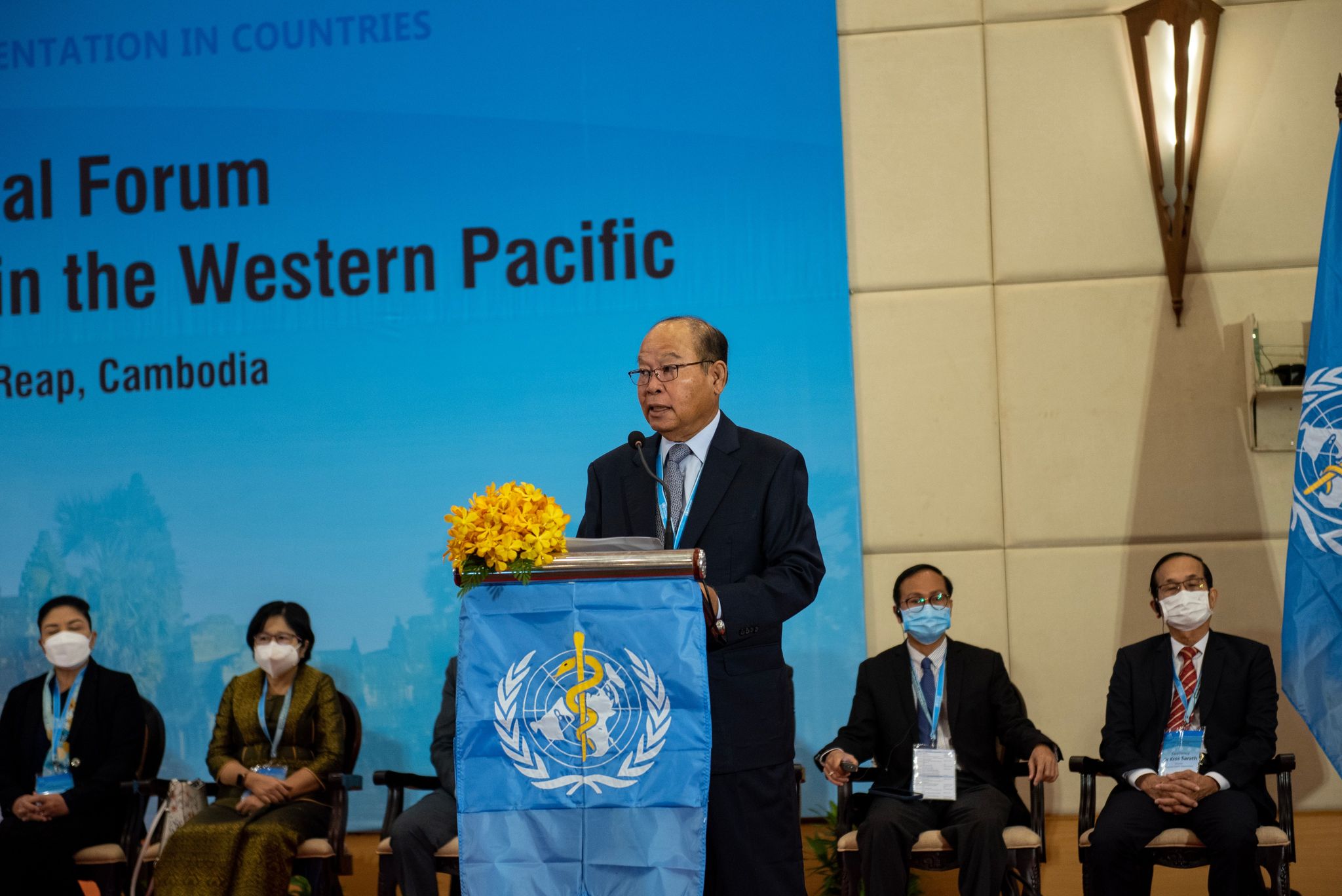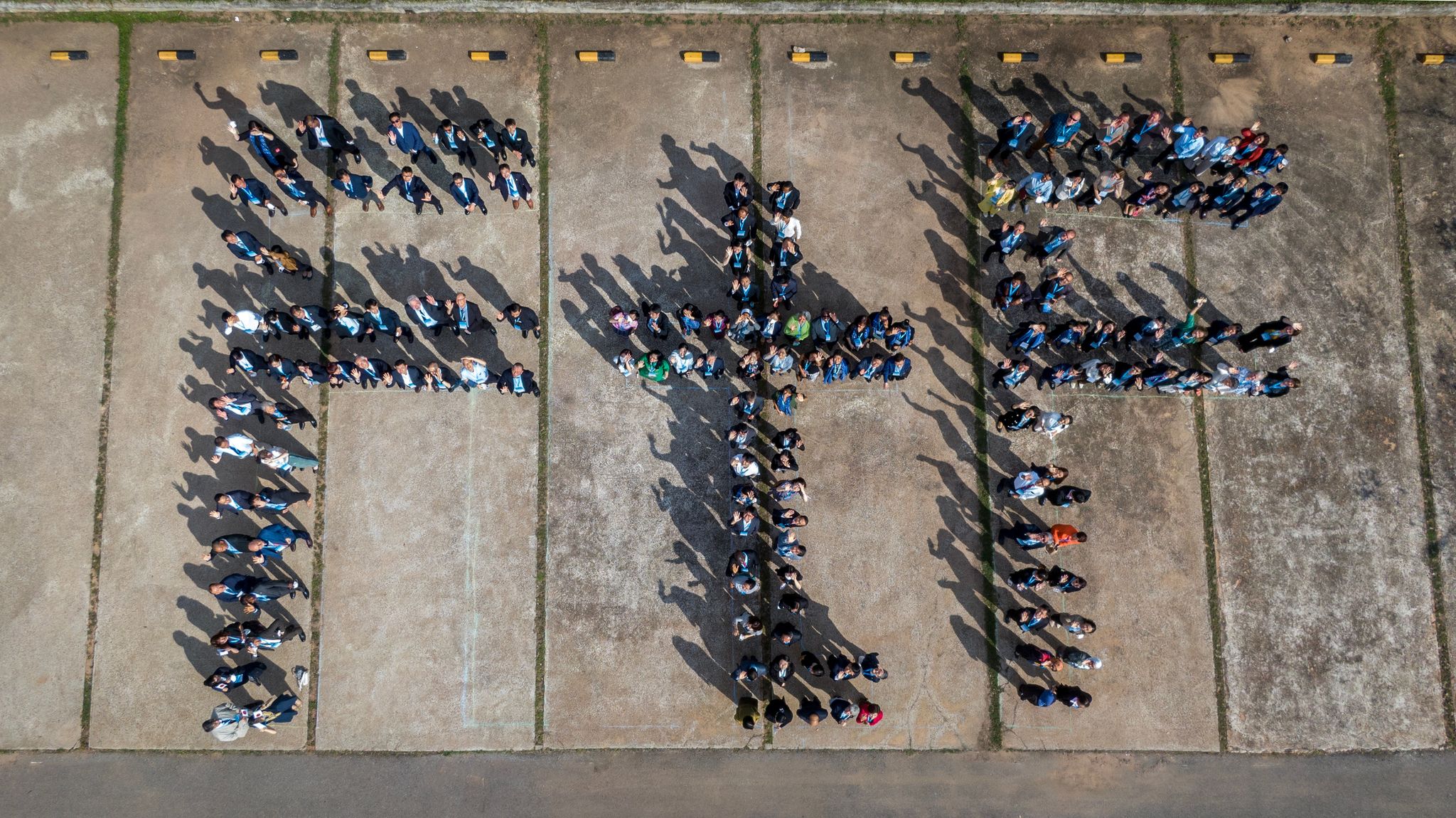
Dr Corinne Capuano, WHO’s Director of Programme Management for the Western Pacific (centre left) and H.E. Professor Mam Bunheng, Minister of Health of Cambodia (centre right) during the opening of the Fourth Regional Forum of WHO Collaborating Centres in the Western Pacific. WHO/Aforative Media
Health experts from academic and other institutions across Asia and the Pacific who gathered in Siem Reap, Cambodia and online acknowledged the progress that has been made in strengthening collaborative and strategic partnerships with WHO in recent years. Representatives from more than 120 WHO collaborating centres in the Region also recognized the need to harness more innovative, integrated and cross-cutting approaches to drive country-level impact in line with For the Future (FtF) – the vision for WHO’s work with Member States and partners in the Western Pacific Region.
H.E. Professor Mam Bunheng, Minister of Health of Cambodia, expressed his delight in people coming together in person, not only to experience Siem Reap but also to discuss an important agenda: “I strongly believe that this two-day forum will provide the opportunity for you, Excellencies, ladies and gentlemen, to discuss the support of WHO collaborating centres, the role of WHO, and more critically, to take collective action with innovation, with the potential to really help countries in the Region like Cambodia, accelerate progress towards their health goals – and the attainment of the For the Future vision.”

H.E. Professor Mam Bunheng, Minister of Health of Cambodia, conveying the important role of WHO and collaborating centres in helping countries like Cambodia achieve their health goals. WHO/Aforative Media
In a video message to participants, WHO’s Director-General, Dr Tedros Adhanom Ghebreyesus, also acknowledged the importance of the work of the more than 800 WHO collaborating centres globally, including about 200 in the Western Pacific Region:
“You have played a vital role during the COVID-19 pandemic, in [virus] sequencing, building testing capacity, and more. And of course, you make a vital contribution to many other areas of WHO’s work, in generating the evidence to support the guidance on which our Member States depend. WHO is committed to strengthening our work with collaborating centres, particularly in low- and middle-income countries.”

Dr Tedros Adhanom Ghebreyesus, WHO’s Director-General, addressing participants via video message. WHO/Aforative Media
The Forum, held from 28 to 29 November 2022, provided an opportunity for WHO and collaborating centres to reflect on the partnership, identify opportunities to maximize collaborating centres’ contributions, and explore mechanisms for more effective ways of working to deliver greater impact for countries.
Dr Corinne Capuano, WHO’s Director of Programme Management for the Western Pacific, spoke of the significance of this year’s agenda:
“Our shared commitment and passion for supporting countries in the Region to tackle health challenges is at the core of this Forum’s agenda,” said Dr Capuano. “The challenges are enormous: ever-present risks of health emergencies; rapid urbanization and changing lifestyles that contribute to increases in noncommunicable disease and air pollution; increases in extreme weather events linked to climate change... Now more than ever, we need to maximize the impact of our efforts to support Member States. This means finding workable ways to collaborate more strategically, more efficiently and more effectively for better results on the ground.”

Participants visit Char Chhouk Health Center in Angkor Chum operational district, Siem Reap province to gain a deeper understanding of primary health care in Cambodia and identify ways to better support Member States with their challenges. WHO/Aforative Media
Discussion during the Forum culminated in agreement on an outcome document setting out a series of recommendations for WHO’s work with collaborating centres over the coming years. This included working together at the strategic planning stages to best leverage the breadth of expertise, capacities, networks and resources of collaborating centres, to broaden their contributions to the priorities set out in the Region’s For the Future vision.
WHO and collaborating centres also agreed to improve coordination, create an innovation ecosystem within the context of collaborative efforts, and strengthen dialogue around the common challenges that exist within and between countries in the Region to ensure efficient use of expertise and resources.
WHO Deputy Director-General Dr Zsuzsanna Jakab thanked representatives for their reflections, input and broader contributions to WHO’s work: “It is clear that there is great solidarity and dedication among the network of collaborating centres in this Region. And eight years on from the first Forum, we continue to form new linkages, build stronger ties, and discover new ideas. We are so happy to have all of you as part of the WHO family. The Organization’s mission to promote health, keep the world safe and serve the vulnerable would not be possible without the work that you do.”

Delegates form “FtF” to represent the Region’s For the Future vision. WHO/Aforative Media
The Fourth Regional Forum of WHO Collaborating Centres in the Western Pacific was organized by WHO in Siem Reap, with participation of the Royal Government of Cambodia and support from the Ministry of Health.
Note to editors
WHO collaborating centres are institutions such as research institutes, parts of universities or academies, which are designated by the Director-General to carry out activities in support of the Organization's programmes. Currently, there are over 800 WHO collaborating centres in over 80 countries and areas working with WHO on areas such as nursing, occupational health, communicable diseases, nutrition, mental health, chronic diseases and health technologies.
In response to the evolving global health landscape and the critical role of partnerships within and beyond the health sector in delivering results, WHO in the Region took significant steps to intensify its partnership with WHO collaborating centres, convening the First Regional Forum of WHO Collaborating Centres in the Western Pacific in 2014.
